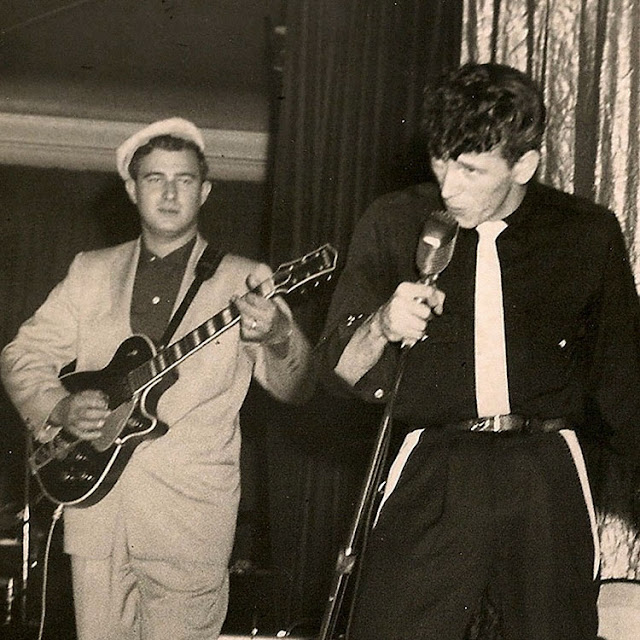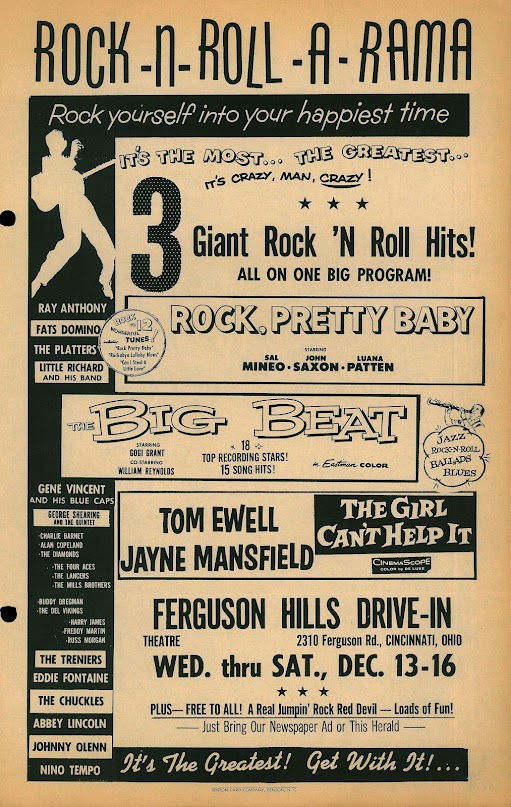Taming Lion That Was Rockabilly
Outlaws On the Air and Screens --- Part Two
Nice to recall at least tail end of earlier R&R, and there are CD collections with virtual books included to detail history of marvelous movement (real) gone against the grain, “Rockin’ Bones” from Rhino good as gathers get, being four discs with one-hundred songs spread across same. I’ve seen rockabilly referred to as “gloriously primitive,” which beside generic “pop” of the period it easily is. Category, name, whatever whoever called it, melted down from country, rhythm/blues, folk, hillbilly boogie, every sort of styles one could steal, Peter robbed to imitate Paul. Visionaries were rare as genuine talent in any field, example onscreen battle of bands or singers John Ashley and Gene Vincent in AIP’s Hot Rod Gang (1958), Ashley proposed a next big thing making like Elvis, not so bad but neither was score of others. Vincent on the other hand was the real deal, glittering gold aside pyrite, him one of few rockabilly artists to score a major recording contract, with Capitol, his hit Be Bop A-Lula claimed by them to have sold two million copies, stunner number beside 500-1000 pressed for others, and which maybe-maybe not sold. Hot Rod Gang was rigid application of formula, recipe as follows: boys and girls called actors and got cheap, souped-up cars driven through L.A. minus city consent, rock and roll indifferent if not bad apart from blue moon someone like Gene Vincent hired presumably for pennies, plus dancing and a lot of it because that’s thrifty too for staging indoors with a stationary camera to eat up footage, a fist fight or three also on enclosed space, all such and more against flattest lighting.
 |
| There are Guitar Collectors Who Regular Cross the Country in Hope to Find Treasure Like This |
A thing like Hot Rod Gang can be bad without necessarily being dull, but that will depend on one’s threshold for fisticuffs, rock-roll, and souped-up cars. Hot Rod Gang earned $263,000 in domestic rentals, and I noted among producers Charles “Buddy” Rogers, among other things more a musician than anybody appearing in the film, could play whatever instrument man had so far devised, but belonged to times and trends forever passed. Imagine Mary’s reaction when he came home from work at something called Hot Rod Gang. Among things good about AIP was how they met their target audience on latter’s home ground, no preachment nor condescension, however calculated product was, but so was radio, magazines, television, all targeting teens. Radio was how most received music lots called outlaw, late night play making fruit the more forbidden, plus fact you’d often not locate 45’s even where intent upon it. No store stocked everything. If your choice was a “hit,” OK, otherwise wait and hope a D.J. would spin it. I dug the instrumental theme for Because They’re Young by Duane Eddy and the Rebels in 1960 and recall search at age six to acquire it. Now there is 24/7 access at You Tube. I call that progress. For the record, Eddy played a 1957 Chet Atkins Gretsch 6120 guitar, which admittedly matters to me less than for many whose passion revolve around such instruments. Among reasons to travel back if such was possible: learn the guitar, opportunity long since missed, and too late now. My mother tried taking piano lessons in her sixties and no soap, her realizing too much tide had gone out to master such complex new thing. If ever I thought of picking up a guitar, there’s but her effort to discourage me.
Certain ordinary men left giant footprints on guitar sound. James Burton backed Rick Nelson, Cliff Gallup was beside Gene Vincent. Then there was Link Wray who was from North Carolina. I said ordinary because these men never pretended to rock star glamor or image molding (possible exception: Link Wray, who adopted “outlaw” image to burnish “dirty” power chords). Guitarists were generally older men who’d adapt themselves to new style that was rockabilly and later rock and roll, their talent such as to make it look easy. Without these artists modestly doing their thing, voicers out front, no matter how teen idol-ish, could as well fold up and go home. Thing I glean from reading about such geniuses (and many of them really were that) is how music while fun and maybe profitable was a thing not to rely on where family had priority past touring grind and younger people’s idea of adventure that these comparative old-timers had seen plenty enough of. For most part, they were admirably focused and grown-up men, dedicated and always improving on their art, leaving spotlights to “front men” who'd sing and seize attention, this more occupation of youth and tendency to believe promoters who promised wealth and fame, latter which singers sometimes got, money mere vapor off transient applause. Instrumentalists, session players, worked on C.O.D. basis and trusted little apart from their own talent and how to get paid for it. Scotty Moore didn’t mind being stared at less than Elvis Presley whom he made look good, Burton of same mind where backing Nelson, such level heads less likely to end up wrapped around phone poles. Many in fact traded road life for mundane pursuits that would reliably pay bills and maintain a solid roof. Joe (“Duck Tail”) Clay recorded over a single month in 1956, left ten “incendiary” tracks before disappearing. Searchers located him thirty years later driving a school bus.
 |
| To-Be Mystery Man Cliff Gallup Performs with Gene Vincent |
“Mystery men” were those of near supernatural abilities who left their public behind and played to suit themselves and occasional small venues. These were said to be unapproachable, avoiding most who admired them, though plenty were still listed in phone books and living normal among neighbors who’d not know or care of such greatness in their midst. Cliff Gallup was a Houdini of electric strings who spoke with music rather than words, reticent it’s true but only because fervid fans made him self-conscious, and besides, what was all such fuss about? He played rock and roll guitar a few years with Gene Vincent, then hung it up. Reminds me of literary counterparts like J.D. Salinger or H. L. Mencken who lived comfortably among locals who knew but did not worship them. Both so far as locals figured were plain folk, Mencken as member of clubs and lodges, Salinger helping boy scouts sell hot dogs at little league games. That which famed guitarists touched became holy relics, specifically their instruments which were objects of intense search by collectors who might themselves be transformed by mere coming into physical contact with said items of veneration. Deke Dickerson is an outstanding rockabilly performer and historian that also wrote two books where he detailed years-long quest for guitars which had belonged to his idols, surprisingly many found in attics, pawn shops, anywhere but places of honor they deserved to occupy. To touch an instrument as was touched by genius might for all one knows transmit spark of genius into the now possessor. Could it happen … has it happened?
“Dirty” guitars provoked in-part hostile response to rockabilly and rock-roll
to come, but deliberate distortion of amplified sound had been around longer
than either musical movement and besides, everybody save societal watchdogs
seemed to like it. There are You Tube histories of equipment turned evil and
how we supposedly were corrupted by same. I never knew that a song, an
instrumental yet (“Rumble” by Link Wray) was banned from radio play in several regions, this part-why a mainstream took charge of music so as to calm
us all down. Sedative was supplied by Bobby Vee generation that was the early
to mid-sixties, him plus the Four Seasons, Beach Boys, Gary Lewis and his
Playboys, others as moderating. Wilder rockers were ahead as the original crop perished
in large part of exhaustion or their own excesses. What mercy of fate allowed
Jerry Lee Lewis, Chuck Berry, and Little Richard to live seeming forever as others went down in road, plane, and narcotic crashes? DJ’s that once pied
piped for newest bold songs now were told by management what they could
broadcast, management string pulled by senior management, and so on up the line. Wide
open traveling hops, revues, all gone as had been big bands of the
forties that thrilled towners large and often small, jukeboxes installed everywhere
to encourage dance with milk shaking, clubbing of any sort, whatever went on
indoors. Local TV outlets had dance shows and invited kids to participate on
camera, ours on Charlotte Channel 9 and called “Kilgo’s Kanteen.” People thought different then about music, it being more social than solitary
pursuit, idea of ear buds and download listening things of a far
future. Some are saying however that live performance is coming back in big
ways. True?








5 Comments:
In the 1958 Curtis/Poitier flick 'The Defiant Ones' one of the pursuing posse wears a radio slung around his neck which is permanently tuned to a rock'n'roll station, blaring rock music of a kind which is quite rare to hear anywhere nowadays. It really does have a different vibe to it.
Depends how you define "live music". In England, where they take pop music much more seriously than America, the big-name concert/ festival scene is roaring, but the lower rank is contracting according to a venue owner's trade association. There are record numbers of pubs, nightclubs, and small theater closures. In the states, an unusually large number of smaller festivals have canceled or shut down in the last 2 years. Ticketmaster is squeezing blood from the stones of bar-level venues, edging live music closer to economically unviable for some. Big name festivals like Coaechella and Outside Lands have not sold out for the first time in years. Odds are the future of live music will not look anything like the present.
The fella with the radio in "Defiant Ones" is Carl "Alfalfa" Switzer, is it not?
Speaking of guitarists, when Scotty Moore decided not to join Elvis's touring band in 1969, Elvis hired...James Burton. He's frequently onscreen in the concert films Elvis: That's the Way It is (1970) and Elvis On Tour (1972). The former is a better showcase of the King's talents than any of his '60s films.
It might have been "Alfalfa" for all I know; not ever being any kind of a "Little Rascals" fan, back when I saw the picture I'm not even sure I would have known who "Alfalfa" even was.
Post a Comment
<< Home